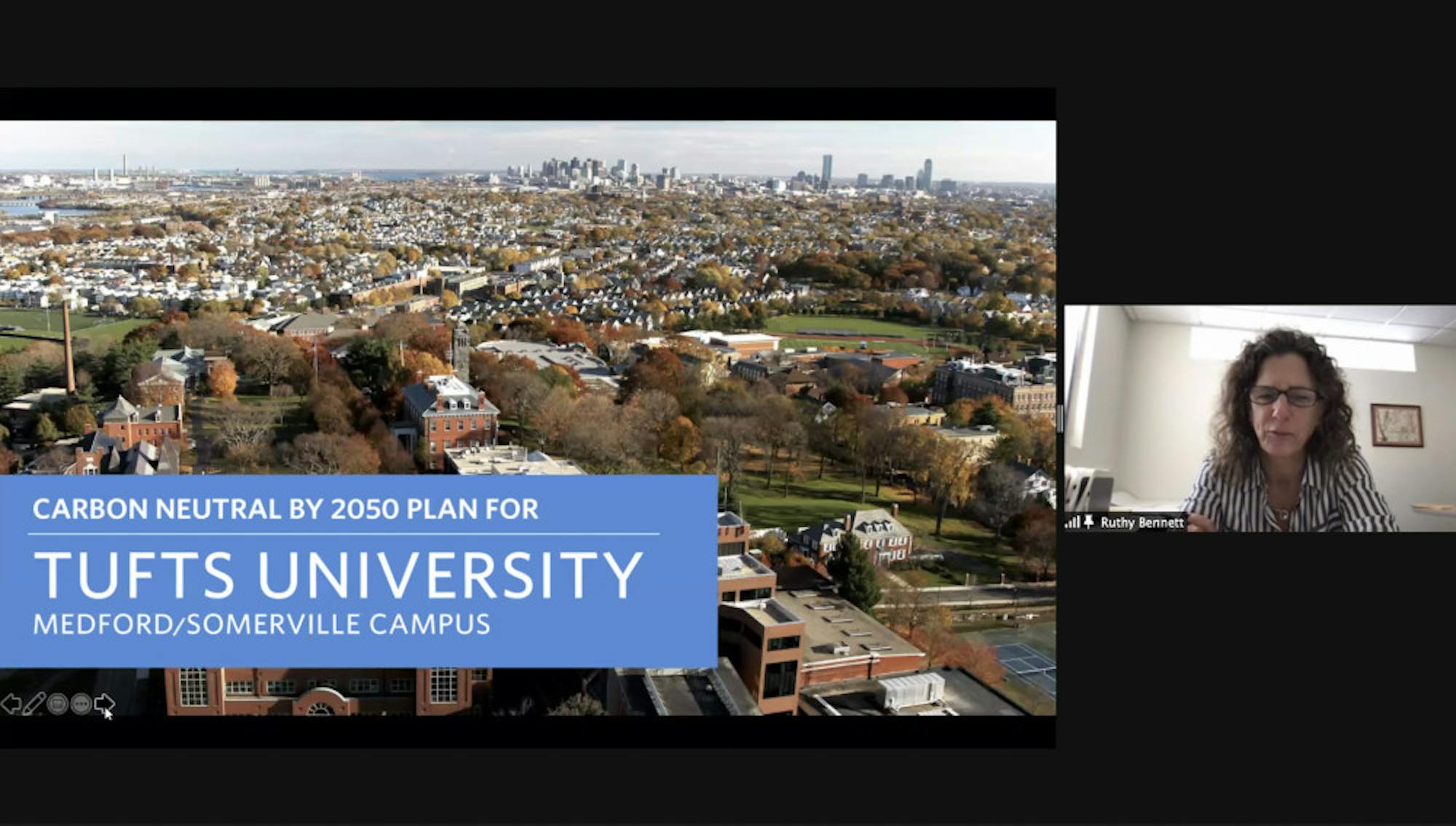The Office of Sustainability commenced its “Path to Carbon Neutrality” webinar series on Oct. 7, hosting a webinar entitled "Decarbonization at Tufts."The webinar featured an overview of the university's current decarbonization initiatives and sustainability commitments.
The webinar included a presentation by Ruthy Bennett, director of strategic capital programs at Tufts. Bennett, an architect with a certificate in sustainable design and construction, began by describing Tufts' strategic plan for carbon neutrality in its buildings and utilities.Bennett said that the university is tracking emissions, investing in renewable electricity and installing solar panels wherever possible.
Bennett explained that Tufts aims to reduce its carbon emissions by 80% and offset the remaining 20% of emissions by building renewable energy infrastructure.
Tufts is a signatory of the American College & University Presidents’ Climate Commitment, and Bennett said that the university fully supports efforts to cut emissions. However, facilities still largely rely on fossil fuels.
"The gas and oil [industries] are so heavily subsidized that almost every single building naturally relies on gas to heat it, to get electricity, to cool it," Bennett said. "Our commitment is to use renewable energy anyways, even if it's not as subsidized, and also to lower how much energy we need in the first place."
Tufts' central energy plant currently runs on natural gas. Bennett said that the long-term plan is to switch to a form of renewable energy but that the technology to support university-wide use of renewable energy does not exist yet.
Despite this obstacle, there are a number of projects on campus that are bringing Tufts closer to its goal of carbon neutrality. The central plant, though run on fossil fuels, is more efficient than a decentralized energy grid. Additionally, the university is working to make maintenance more sustainable by transitioning broken facilities and equipment to newer, more efficient technology.
"It used to be [that] if something broke, you just replaced the exact same thing with the newer model," Bennett explained. "Now, the goal is, if you have something that relies on steam and it breaks, we want to see if we can replace it with something that relies on hot water."
Tina Woolston, director of the Office of Sustainability, was another host of the event. Woolston said that the office aims to increase sustainability at Tufts by providing resources and advocating for more sustainable policies.
"We serve as … the bridge between ideas and their practical implementation," Woolston said during the webinar.
In an interview with the Daily, Woolston explained that the Office of Sustainability strives to engage students.
“I think it's really important because as an institution of higher education, we educate the people who develop and manage institutions," Woolston said. "We have a responsibility to increase awareness, knowledge of technologies and [to provide] tools that are necessary to create a sustainable, equitable future for everyone — not just the rich people, not just Americans, but everyone across the world.”
The "Decarbonization at Tufts" webinar was co-hosted by Tufts Climate Action, a student organization that has advocated for Tufts to reduce its carbon footprint.
Julia Silberman, one of the leaders of TCA, discussed how the group has contributed to sustainability initiatives on campus.
“We are pushing for institutional change to promote climate justice, primarily through divestment from fossil fuels, but also through other related climate justice initiatives locally or nationally or just on campus,” Silberman, a junior, said.
Silberman explained that TCA first got involved with the carbon neutrality project during the summer of 2021.
"Over the summer, one of the things TCA was looking into was the progress that Tufts has been making on decarbonization," Silberman said. "We really wanted to learn more about this carbon neutrality by 2050 plan … So we contacted the Office of Sustainability just to talk about it … That’s where the idea for having this webinar series came about.”
Silberman said that TCA aims to hold the university accountable and ensure that broad sustainability plans are supported by actions.
"The climate change we've been seeing is just so tangible, like storms [and] fires," Silberman said. "So we want to check in and see what [Tufts is] doing, if they have any guideposts."
Silberman added that institutional accountability is important when implementing a long-term decarbonization initiative.
"Because 2050 is so far away, the people who are working at Tufts now are not going to be working here in 2050," Silberman said. "I think it's really important to have accountability for what happens after you're gone."






